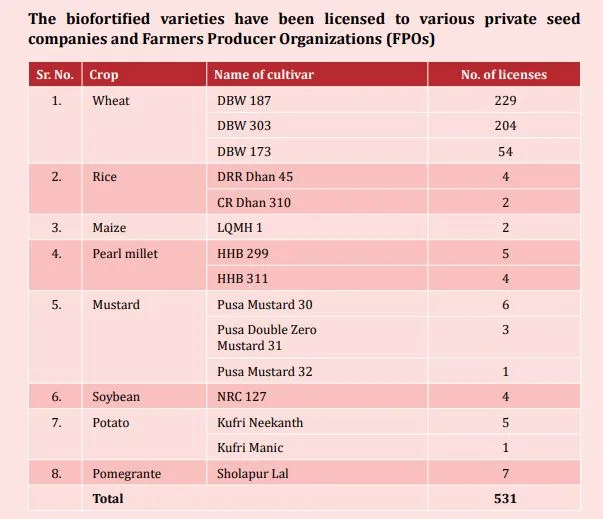Syllabus: GS3/Agriculture
Context
- Scientists, policymakers and industry representatives participated in the 13th edition of the three-day National Seed Congress (NSC).
- NSC is an annual confluence of researchers, policymakers, farmers, and representatives to strengthen the agricultural sector in India and globally.
About
- Theme: Innovating for a Sustainable Seed Ecosystem.
- Major Highlights:
- To work more on innovative seed technologies for farmers in the country.
- Fostering South-South Collaboration in the Seed Sector.
- The focus will be on hybrid and biofortified crops, stress-tolerant varieties, and accelerated breeding cycles.
- Public-Private Partnerships in the sector to promote sustainable seed production and distribution.
- The outcomes of these deliberations will be implemented with the full support of the State government to ensure food security, economic growth, and the welfare of farmers.
Hybrid Crops
- Hybrid crops are created through the process of crossbreeding two genetically different plants, typically from different varieties or species, to combine desirable traits from both parent plants.
- Aim: To produce offspring that have superior qualities, such as increased yield, disease resistance, drought tolerance, or improved nutritional content.
- Concern: Hybrid crops often do not produce seeds that retain the same beneficial traits as the parent crop, so farmers need to purchase new seeds each year.
Biofortified Crops
- Biofortified crops are those that have been specially bred to have higher levels of essential nutrients, such as vitamins, minerals, or amino acids, than their conventional counterparts.
- This is done through traditional breeding techniques, genetic modification, or modern biotechnological methods.
- Aim: It aims to improve the nutritional value of crops, especially in regions where deficiencies in essential nutrients are widespread.
- Golden Rice has been genetically modified to produce higher levels of provitamin A (beta-carotene), aiming to reduce vitamin A deficiency.

Key Difference:
- Hybrid crops focus on improving traits like yield, resilience, or growth characteristics by crossbreeding different varieties.
- Biofortified crops focus on improving nutritional content to address deficiencies in key micronutrients.
Merits of biofortification:
- It is regarded as the most sustainable approach to alleviate malnutrition.
- It provides nutrients in natural form.
- Biofortified food is affordable as it does not involve any additional price.
- ‘Biofortified varieties’ are as high yielding as ‘traditional varieties’, thus no loss is incurred to the farmers.
- It does not require elaborate infrastructure facilities as required in ‘food fortification’.
- It does not involve additional cost on preparing the enriched food grains.
Government Initiatives to Promote Sustainable Seed Production and Distribution:
- National Seed Policy (2002): Encourages the private and public sectors to increase seed production, improve quality control, and facilitate the distribution of seeds.
- National Gene Bank: Maintains the genetic diversity of crops, conserving traditional and indigenous varieties for future use.
- State Seed Banks: Support local farmers by conserving native seeds and facilitating seed exchange.
- National Food Security Mission (NFSM): To increase the production of staple crops like rice, wheat, and pulses, with a focus on promoting the use of high-quality seeds.
- Pradhan Mantri Krishi Sinchayee Yojana (PMKSY): It encourages the use of climate-resilient seeds for water-scarce regions.
- National Mission on Organic Farming (NMOF): Encourages organic seed production, providing subsidies for organic inputs and promoting seed-saving techniques.
- Farmer-Producer Organizations (FPOs): FPOs facilitate the production and distribution of locally adapted seeds, enhancing the involvement of farmers in seed systems and promoting seed diversity.
Source: TH
Previous article
Coastal Crisis: 33.6% of India’s Coastline Threatened by Erosion